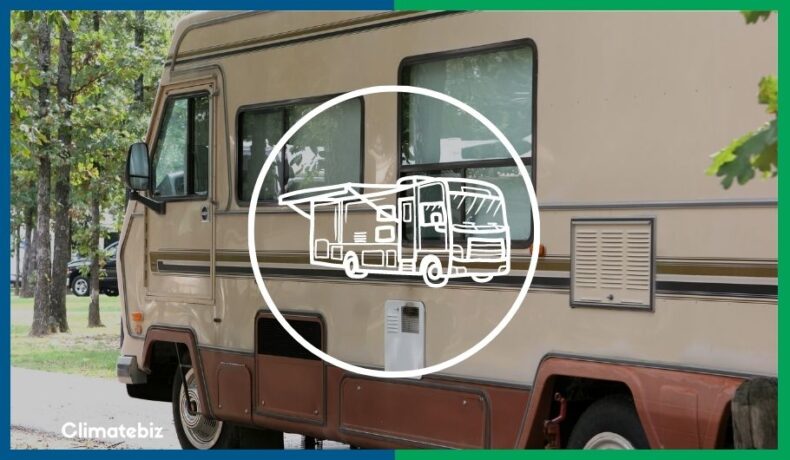A solar generator for your RV will provide you everything a gas generator would, only without the loud noise and the toxic gas emissions.
Also, you don’t need to spend extra money on gas — solar generators are fully rechargeable by sunlight (using RV solar panels), which is available for free everywhere!
In this article, we’ll cover everything you need to know about solar generators for RVs. Moreover, we’ll discuss it’s a smart move to have one and present a few of the best solar generator options out there.
Table of Contents
Can A Solar Generator Power An RV?
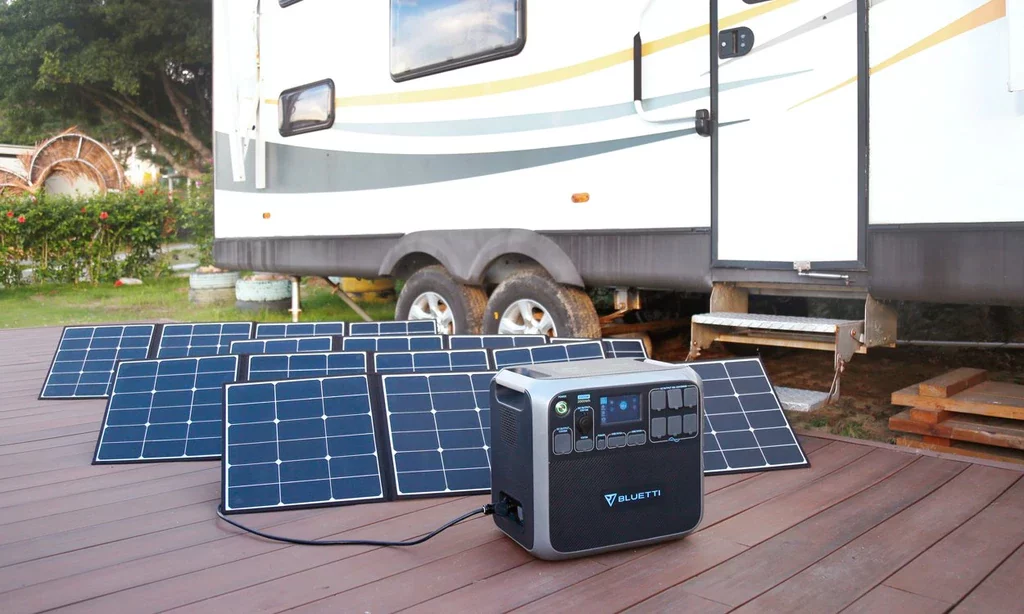
Source: bluetti.eu
Yes, you can use a solar generator to power your RV. That’s not only a possibility; it’s also an advantage in many ways.
Solar generators are environmentally-friendly, portable, versatile, don’t consume fuels (so no carbon emissions), silent, and easy to use.
However, there are a few crucial factors you should consider:
Firstly, you have to determine how much power your RV requires. Secondly, you must understand the basics of your RV’s electrical system. Finally, you need to find the solar generator that best suits your needs.
We know these things are easier said than done. But don’t worry; we’ll guide you through each one of these steps.
Estimating Your Energy Demand
The power consumption of the average American RV is about 20 kWh.
In reality, these numbers vary a lot for each case. It depends on the number of appliances you have, how power-hungry they are, and the season you’re in (summer and winter require A/C or heaters, which consume more energy).
Moreover, your power consumption when boondocking (no electrical grid available) will probably be lower than when you’re using shore-power (RV plugged into an AC electrical grid) since you’ll be using only the essentials.
So before you go shopping for a solar generator for your RV, you should first ask yourself, “How much power do I need to run my appliances?” The answer is key to deciding on a solar generator.
RV’s Electrical System
An RV’s electrical system is rated for either 30 Amps or 50 Amps.
At campgrounds, you can find both receptacles. Here’s how they look:
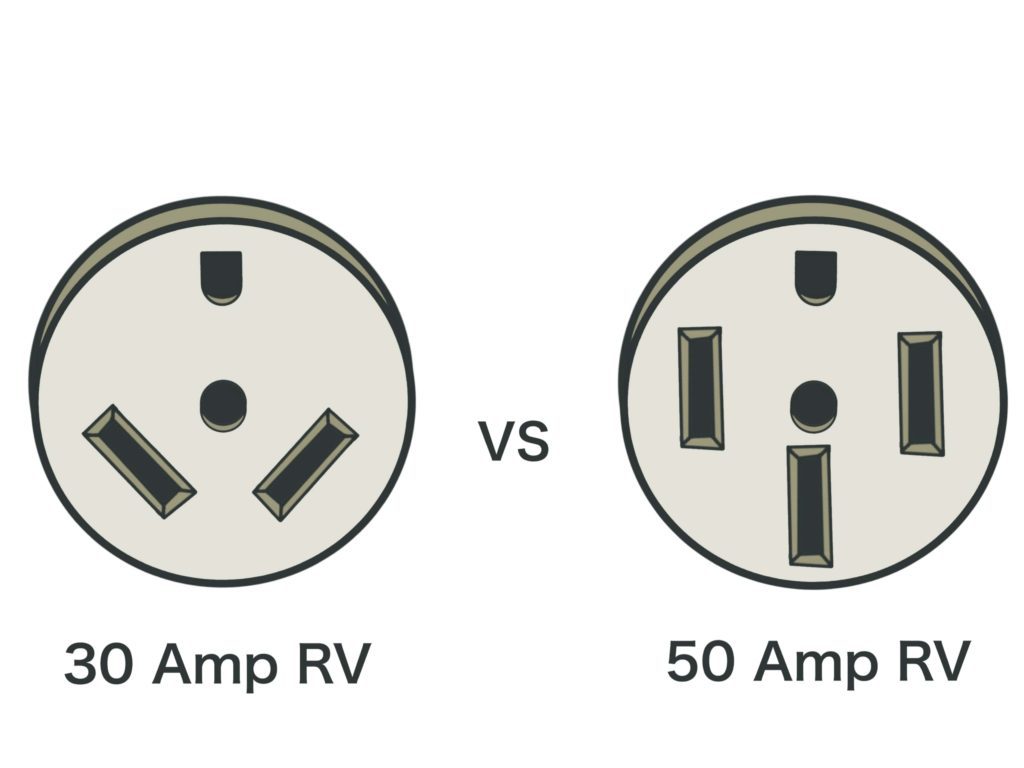
RVs that use a 30 Amp electrical system have low electrical demands (typically one roof A/C, a convection oven, an RV refrigerator, and a few 120V outlets throughout the RV).
This means that the total amount of power available in the RV is:
Power (W) = Voltage (V) x Current (A) = 120V x 30A = 3600W
Meanwhile, you’ll usually find 50 Amp electrical systems in RVs with high load requirements.
This type of RV is typically equipped with two roof A/C units, residential-style appliances – big fridge, washing machine, dryer -and entertainment centers.
We also refer to 50A systems as 120/240V split-phase systems because they use two 120V hot wires to supply this large amount of current.
Using the formula to calculate power, we can calculate how much power is available in a 50A RV:
Power (W) = 120V x 50A = 6000W
This number is for each 120V hot wire, so the total amount of power this RV can draw is 6000W x 2 = 12000W or 12kW, which is a lot of power.
Solar Generator Options
While some gas generators offer a 50A outlet, there aren’t any solar generators that can provide this amount of current.
Therefore, if you want to plug your RV’s electrical system into your solar generator, the most you’ll get is a 30A outlet.
Technically, you could use an adapter to plug a 50A RV into a 30A outlet (the same way you can plug a 30A RV into a 15A house outlet), but in this case, you’d limit the RV’s power to 30A (or 3600W). Additionally, you wouldn’t be able to run any 240V appliances.
A few models of solar generators come with this 30A RV port — we’ll get to them shortly.
A Simple Way Around The RV Port “Limitation“
Your chances of finding a solar generator with the right amount of power output, enough capacity, and equipped with an RV outlet can be a challenging task.
Alternatively, if connecting your RV’s electrical system directly into your solar generator isn’t a crucial requirement for you, you can plug your appliances directly into your solar generator.
How is this possible? Unlike gas-powered generators, a solar generator doesn’t produce toxic fumes or loud noise. Therefore, you can run the generator inside your RV, next to your appliances. They are also portable, so moving them around inside the RV is feasible.
How Much Do Solar Generators For RVs Cost?
The cost of solar generators varies according to their capacity (Wh) and power (W) ratings. That’s why it is so essential to determine your power and energy demand.
Inverter’s Continuous Power Output
The total amount of power your RV can draw from a solar generator is limited by the continuous power the inverter can deliver. It’s given by adding the wattage of all appliances being powered.
Suppose a solar generator’s inverter is rated for 2000W continuous power. If you power a 1500W microwave and a 1200W toaster at the same time, you’ll be pulling a total of 2700W from your inverter, which is more than it can handle (so it won’t work).
Therefore, the total amount of power your appliances require shouldn’t be greater than what your solar generator’s inverter can deliver.
Capacity (Or Watt-Hours)
Buying a solar generator with a capacity too low for your energy demand means you’ll probably run out of power sooner than expected.
On the other hand, buying a solar generator with too high capacity for your energy demand means you’ve wasted money on something you don’t need.
There’s a large variety of solar generators on the market, with different sizes and capacities:
- Low capacity (from 500Wh to 1500Wh): Prices range from $600 to $1500
- Medium capacity (from 1500Wh to 3000Wh): from $1500 to $3000
- High capacity (from 3000Wh to 5000Wh): from $3000 to $4500
Which Solar Generators Are Best For RV’s?
We’ve selected 4 of the best solar generators for RVs. We chose them based on their rated power and capacity, which are reasonable considering the average wattage of essential RV appliances.
Each of these generators will allow you to:
- Power your RV’s fridge.
- Charge electronic devices (laptop, smartphone, camera).
- Watch TV.
- Heat water to prepare a nice cup of tea, and much more.
All of this, using clean solar energy.
1) Titan Solar Generator
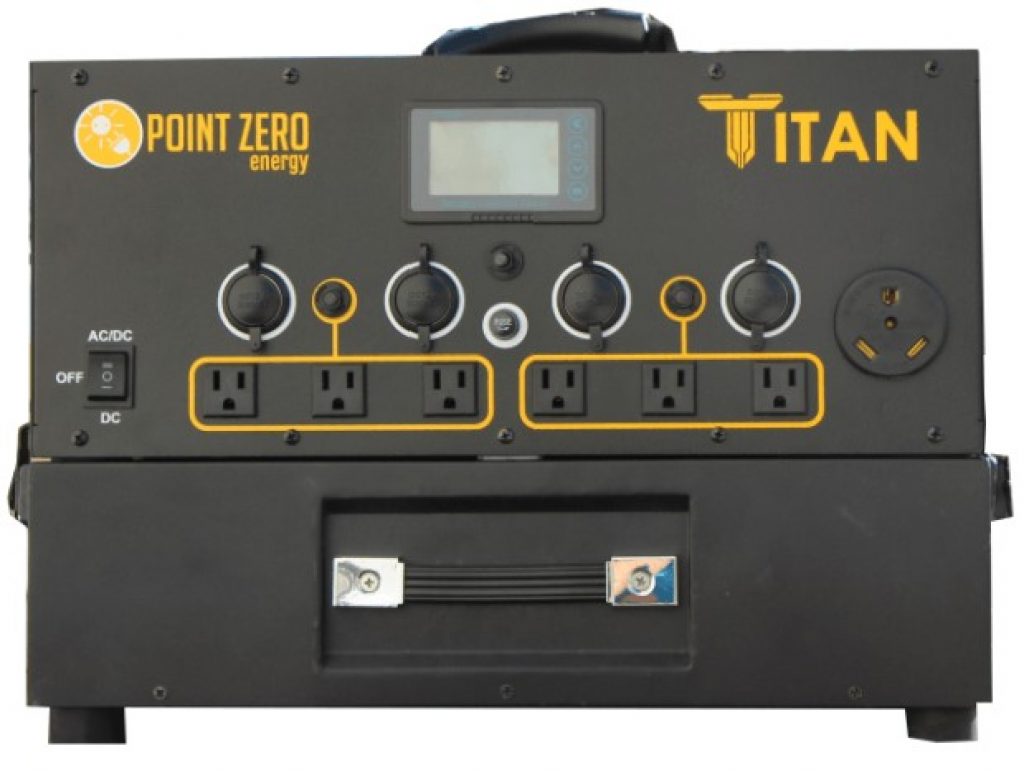
First on the list is the Point Zero Titan Solar Generator.
Tech Specs:
| RV port | Yes, 30A |
|---|---|
| Continuous power output | 3000W (with 2+ battery packs) |
| Power surge | 6000W |
| Capacity | 2000Wh |
| Expandable Capacity | Supports up to 6 extra batteries, 2kWh each |
| Battery Chemistry | Lithium-Ion |
| Battery Life Cycle | Up to 2000 cycles (with 80% DoD) |
| Charging Methods | Solar, AC charger |
| Maximum Solar Input | 2000W |
| Output Options | AC, DC, RV port (30A) |
| Weight | 14.5kg or 32lbs power module; 15.9kg or 35lbs battery |
| Warranty | 2 year limited on Titan Power Module 1 year limited on Titan Battery Pack |
2) BLUETTI AC200 MAX Expandable Power Station
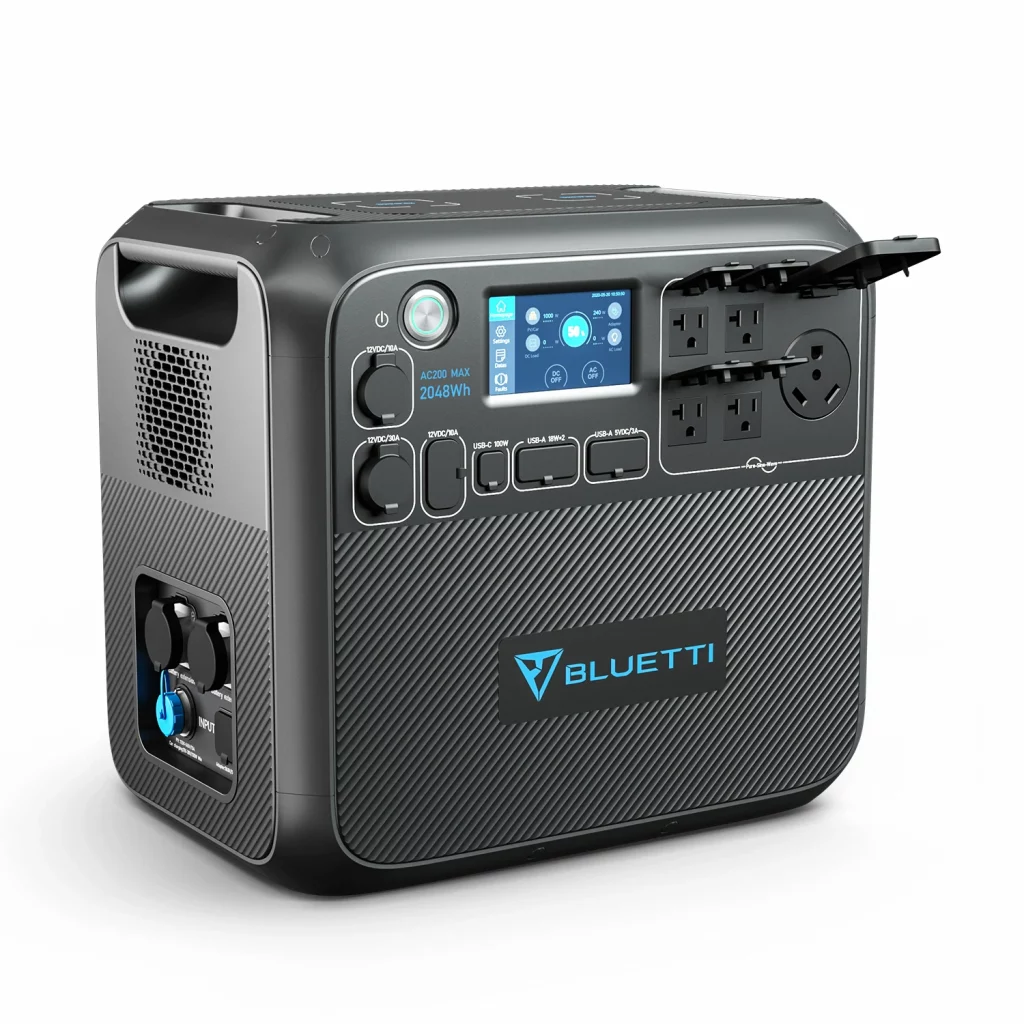
Second on the list, the BLUETTI AC200MAX is a good option for smaller RVs.
Tech Specs:
| RV Port | Yes, 30A |
|---|---|
| Continuous power output | 2200W |
| Power surge | 4800W |
| Capacity | 2048Wh |
| Expandable Capacity | Yes, up to 6,144Wh with 2×B230’s, or 8,192Wh with 2×B300’s |
| Battery Chemistry | Lithium Iron Phosphate |
| Battery Life Cycle | 6,500 cycles to 50% capacity, 3,500 cycles to 80% capacity |
| Charging Methods | Solar, Wall Outlet, Car charging, lead-acid battery |
| Maximum Solar Input | 900W |
| Output Options | AC, DC, USB-A, USB-C, RV port, Car Power Output, Wireless Charging Pad |
| Weight | 28.1kg or 61.9lbs |
| Warranty | 2 years |
3) Hysolis MPS3K Power Station
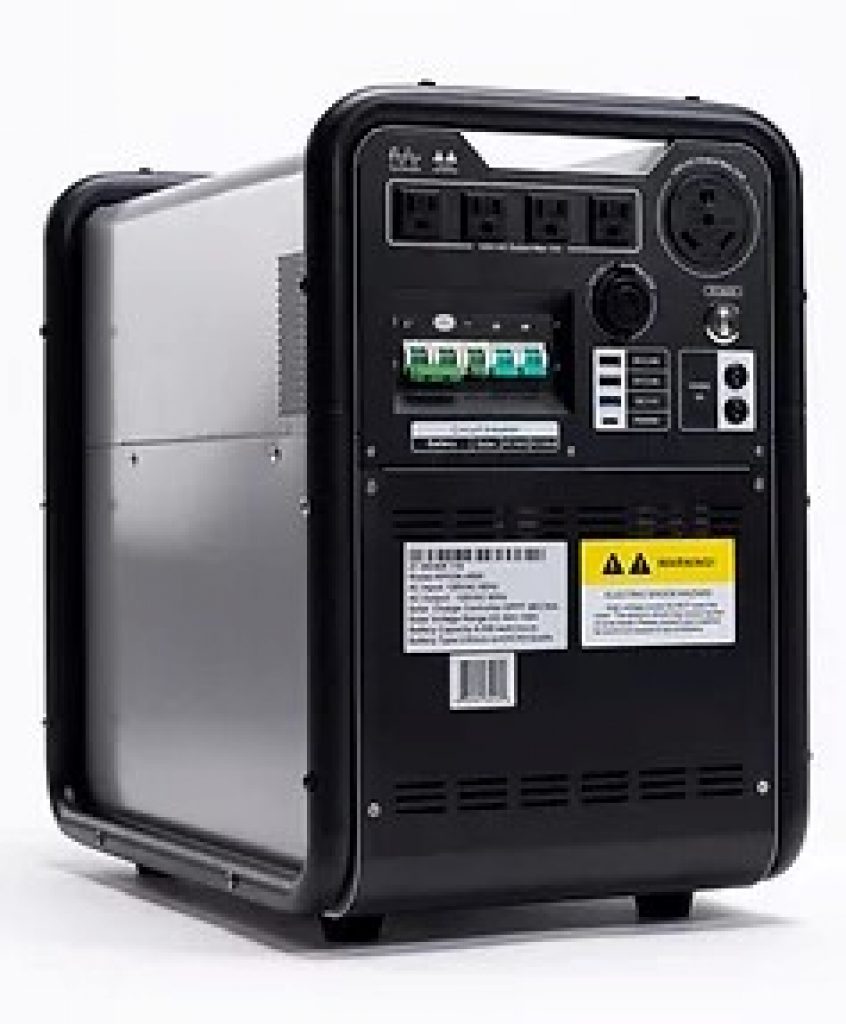
The Hysolis MPS3K is a simple yet powerful solar generator.
Tech Specs:
| RV Port | Yes, 30A |
|---|---|
| Continuous power output | 3000W |
| Power surge | 6000W |
| Capacity | 4500Wh |
| Expandable Capacity | Yes, Battery Capacity Expandable |
| Battery Chemistry | Lithium-ion (NCM) |
| Battery Life Cycle | >2,000 cycles |
| Charging Methods | Car power (DC), Wall outlet (AC), and Solar Panels |
| Maximum Solar Input | 1500W |
| Output Options | AC, wall plug outputs DC, USB-A, USB-C, RV port, Car Power Output |
| Weight | 55kg or 121 lbs (wheels dolly sold separately) |
| Warranty | 2 years for solar generator 3 years for the batteries inside it |
4) EcoFlow DELTA Pro Portable Power Station
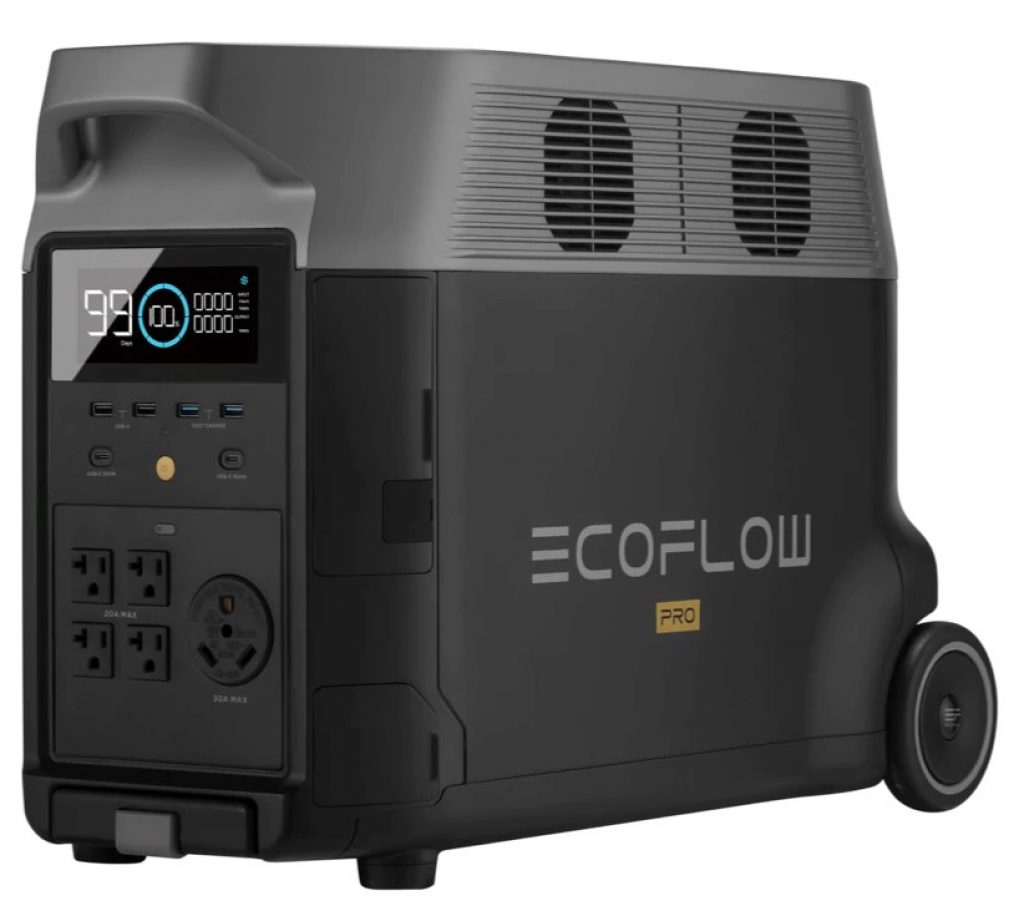
And last but not least, the EcoFlow DELTA Pro solar generator is an excellent solution for larger RVs.
Tech Specs:
| RV Port | Yes, 30A |
|---|---|
| Continuous power output | 3600W |
| Power surge | 7200W |
| Capacity | 3600Wh |
| Expandable Capacity | Yes, it can be expanded all the way to 25kWh (by adding battery modules) |
| Battery Chemistry | Lithium Iron Phosphate |
| Battery Life Cycle | 6,500 cycles to 50% capacity, 3,500 cycles to 80% capacity |
| Charging Methods | Solar, Wall Outlet, Car charging, EV Charging Station |
| Maximum Solar Input | 1600W |
| Output Options | AC, DC, USB-A, USB-C, RV port, Car Power Output |
| Weight | 45kg or 99lbs |
| Warranty | 2 years |
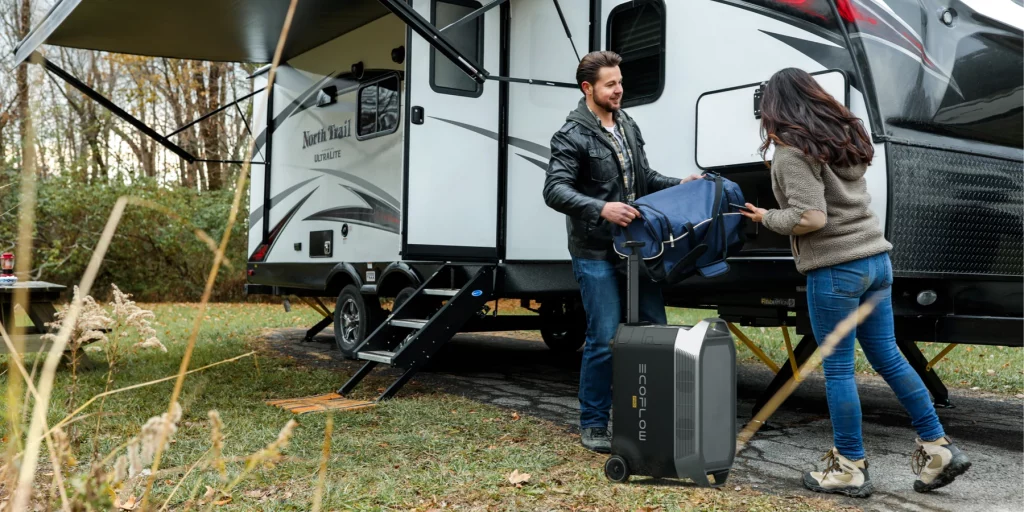
Source: ecoflow.com
What Size Solar Generator Do I Need For My RV?
The size of your solar generator (in terms of capacity) must be proportional to your energy demand.
Therefore, you should first estimate how much power your RV requires. Then you can begin searching for a solar generator with enough capacity (Wh) to run the appliances in your RV.
Here are a few ways to determine how much energy (in Wh) and power (in W) you need in your RV:
1: Checking Your Appliances’ Power Ratings
The wattage is usually stamped on the back or bottom of the appliance. It refers to the power the device requires to function correctly.
2: Calculating The Wattage
If you can find the appliance’s wattage, great, you just skipped a step. If not, you must calculate it using the appliance’s voltage and amperage ratings:
Wattage (W) = Voltage (V) x Amperage (A)
For example, if you TV input is 110V and 0.6A, its wattage is 110V x 0.6A = 66W
3: Using A Power Plug Meter
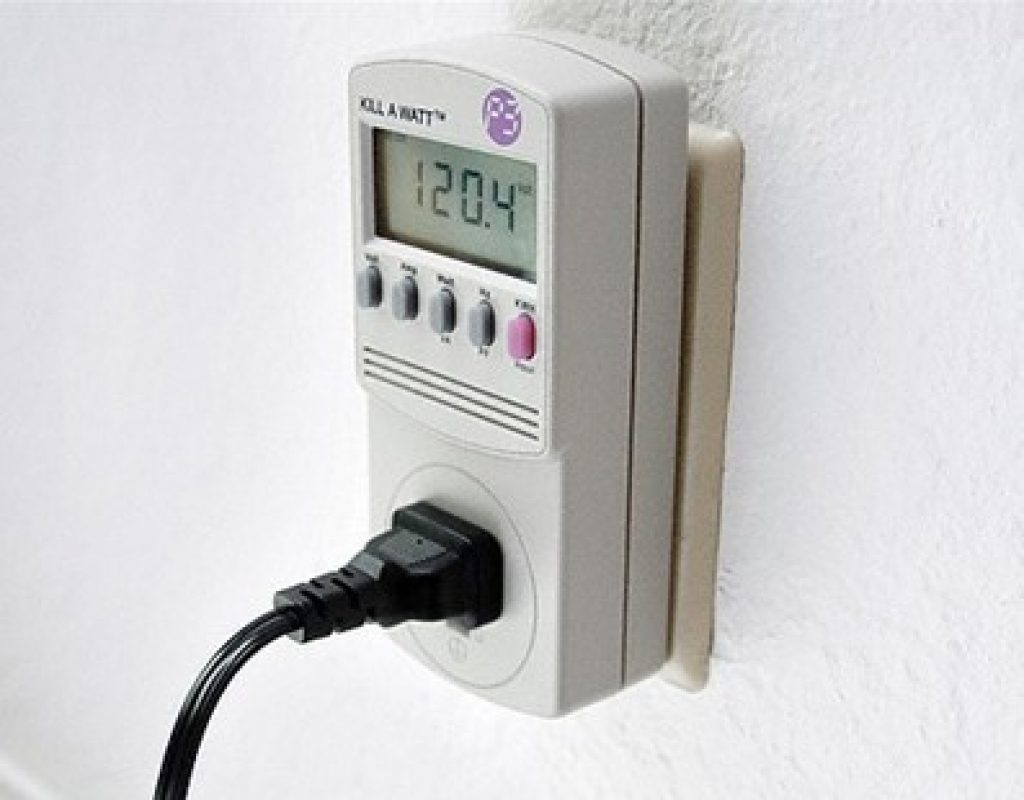
You can plug a power plug meter into a wall outlet and then plug an appliance into this power plug meter. It displays how much power the connected device is consuming at the moment. It also shows the amperage, which comes in handy if you want to calculate the total amount of amps your RV requires.
Once you know the power ratings of your appliances, you need to consider the amount of time (in hours) you’d like to power each of them.
For example, you need to power a fridge 24h a day. Meanwhile, you only power a coffee-maker a few minutes a day.
Energy demand is given by: Energy (Wh) = Power (W) x time of usage (h)
Why is this relevant? Solar generators are rated for their capacity in watt-hours. Therefore, knowing your energy demand in watt-hours is key to deciding on a solar generator for your RV.
Suppose you’ve calculated total energy consumption of 2400Wh; you’ll need to find a solar generator that can provide a bit more than that. Why? Because you need to consider the recommended depth of discharge (according to the battery’s chemistry) and the inverter’s efficiency to convert DC into AC.
You shouldn’t risk running out of power by purchasing a solar generator with a capacity equal to your energy demand — always account for efficiency losses.
Can a Solar Generator Power My RVs Air Conditioner?
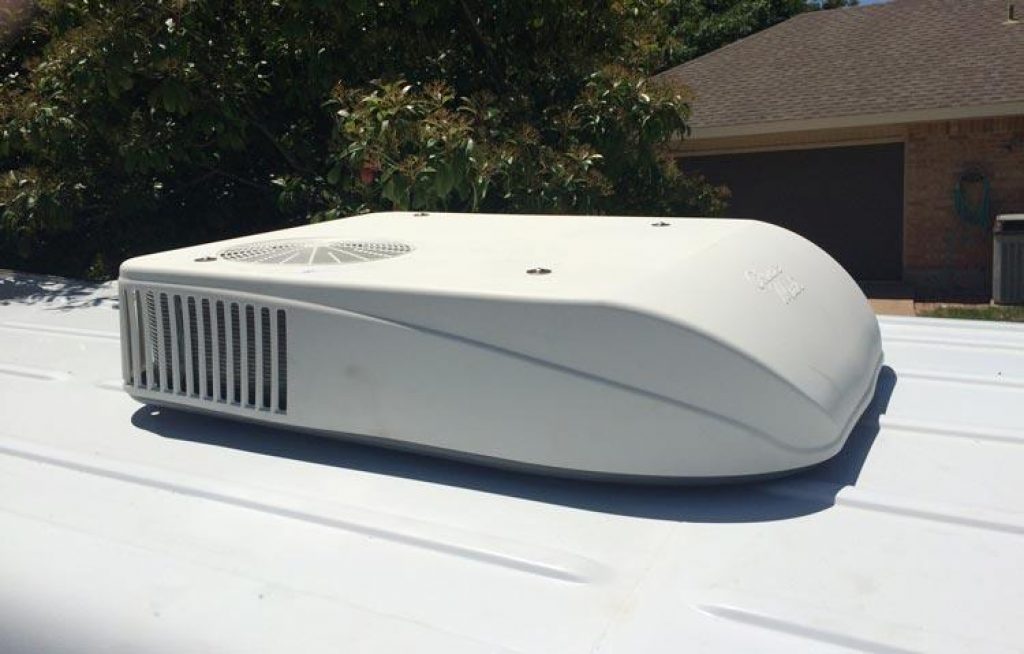
Air conditioners are notorious for being power-hungry appliances. For this reason, one of the most asked questions related to solar-powered RVs is, “Can I run an RV Air Conditioner using solar power?”
The short answer is yes, you can. However, the practicality behind that answer is not as simple.
In order to successfully run your RV air conditioner with a solar generator, you should consider the following:
Solar Generators Continuous Output
Your solar generator’s inverter continuous output should be high enough to handle the load of an RV air conditioner. The power drawn by RV’s A/C units usually ranges from 700W (for a 10,000 BTU unit) to 1,500W (for a 15,000 BTU unit). So you can safely run an A/C rated for 1500W off of a 2000W solar generator.
Inverter Power Surge
The power surge of your inverter must be high enough to start the A/C unit’s compressor. The power required to start the A/C’s compressor is almost double the air conditioner’s rated power. The inverter’s power surge is also usually double its continuous rated power, so it shouldn’t be a problem.
Solar Generator Capacity
Your solar generator’s capacity needs to be large enough to provide energy through periods when there’s no sunlight (so they can’t be charged by solar). However, there are other ways to charge your solar generator (other than solar), so this isn’t a limiting factor.
In conclusion, you can run an RV air conditioner, but this practice isn’t sustainable for an extended period. You’ll drain your solar generator’s battery pretty fast.
For reference, let’s calculate how long (theoretically) you would be able to run a 1200W A/C unit with a fully charged 3600W 3.6kWh EcoFlow DELTA Pro.
Energy (Wh) = Power (W) x Time (h), so Time (h) = Energy (Wh)/Power (W)
Time (h) = 3600Wh / 1200W = 3 hours
So, in theory, you would be able to run this A/C for three hours before completely draining your solar generator’s battery. In reality, you wouldn’t even achieve this 3-hour mark. Why? Because of efficiency losses. No solar battery can deliver 100% of its capacity.
Now it’s easier to visualize how unsustainable — although technically possible — it is to power an RV air conditioner with a solar generator.
On the bright side, the period you need an A/C to cool your RV the most is the same period your solar generators are charged most efficiently by solar energy.
This is in the summertime when the weather is hot.
What Are The Benefits of Using a Solar Generator in an RV?
1) Solar Generators Use A Free And Clean Energy
The main advantage of solar generators is that they can harness energy from the sun. This offers an easy yet environmentally-friendly way to power your RV.
Unlike gas-powered generators, solar generators don’t consume fossil fuels, so they don’t contribute to carbon emissions/climate change. As a bonus, they don’t produce that incredibly loud noise that gas generators are known for.
2) It’s Easy To Use
Solar generators are pretty much “plug-and-play,” so you don’t have to worry about figuring out how to install a complex energy system, like the ones that are commonly used (require you to install a battery bank, charge controllers, inverter, etc.).
Moreover, you don’t have to fill it up with dangerous flammable substances (like you do for gas generators). You can recharge solar generators by connecting them to solar panels or a wall outlet.
3) It’s Portable And Compact
Solar generators don’t take up too much space in your RV (which is limited), and you can move them around inside or outside your RV. This comes in handy when you want to park your RV in the shade and still be able to recharge your solar generators; you can take them outside (to where there’s direct sunlight) and plug them into portable solar panels. In addition, you can quickly transfer it to a new RV if you get a new one.
4) They Are Affordable, Plus You Save Money On Fuel And Campgrounds
Solar generators are a much cheaper option than the alternative (buying batteries, inverter, charge controller, cables, and adapters, plus spending a lot of time setting up this energy system), despite their high upfront cost. In addition, you’ll save money on fuel (needed by gas-powered generators) and or campgrounds (having an excellent off-grid system means power autonomy, so you won’t need to spend money on campgrounds to use shore power as much).
5) There’s A Solar Generator For Every Need
There’s a wide variety of solar generators currently on the market. Therefore, you can easily find one that best suits your power, space, and budget requirements with a bit of research.
Final Thoughts
Using a solar generator in your RV is an excellent idea whether your goal is to use a more environmentally-friendly technology or you’re just seeking an affordable and practical energy solution.
They are super easy to use and provide a variety of benefits. You connect your solar panels to your solar generator and start using them to power your RV.
However, when choosing a solar generator for your RV, you should consider the size of your RV and the amount of power it requires.
Your solar generator should be large enough to provide all the power you need for your RV. If it’s too small, you won’t be able to run all your appliances.
After finding the perfect solar generator for your needs, all you’ll have to do is plug in your RV and enjoy all the unique experiences that come with traveling in an RV.
Safe travels!

